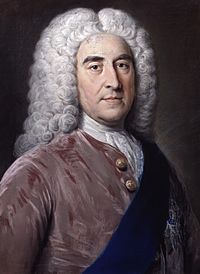Pitt–Newcastle ministry facts for kids
The Pitt–Newcastle ministry was a government that led Great Britain between 1757 and 1762. This was a very important time, right in the middle of the Seven Years' War. The government was officially led by Thomas Pelham-Holles, 1st Duke of Newcastle, who was serving as prime minister for the second time. However, the most powerful and well-known minister was William Pitt the Elder. He was the Secretary of State, in charge of foreign affairs and defense.
Contents
How the Government Worked
This government brought an end to a difficult time in Great Britain. Before this ministry, the country was struggling in the war and had political problems. William Pitt was a strong leader during wartime. But he did not have enough support in Parliament to lead effectively on his own.
Pitt and Newcastle's Partnership
This is where the Duke of Newcastle came in. He had many supporters in the House of Commons. So, Pitt and Newcastle decided to work together. They divided their responsibilities. Pitt focused on defending the country and handling foreign policy. Newcastle, on the other hand, managed the country's money and political appointments. This partnership made the government strong and stable.
Great Victories in War
Under this ministry, Great Britain achieved many important victories in the Seven Years' War. The year 1759 was especially successful. It was called the "Year of Miracles" because of so many British wins. By 1761, Great Britain was in a very strong position in the war.
Changes in Leadership
However, things started to change. In 1760, King George II died. His grandson, George III, became the new king. King George III did not like Pitt or Newcastle very much. He preferred his friend, John Stuart, 3rd Earl of Bute.
In March 1761, Bute, who was a Tory, became the Northern Secretary. Later that year, William Pitt resigned from the government. He disagreed about whether Spain should join the war. After Pitt left, the government was sometimes called the Bute–Newcastle coalition.
The End of the Ministry
In 1762, the Duke of Newcastle was also forced to resign. King George III and Bute removed many of Newcastle's supporters from their jobs. This event was known as the "Massacre of the Pelhamite Innocents." This is usually seen as the moment when the Pitt–Newcastle ministry officially ended.
See also
- 11th Parliament of Great Britain
- 1761 British general election
- Great Britain in the Seven Years' War
- Whigs (British political party)
 | Shirley Ann Jackson |
 | Garett Morgan |
 | J. Ernest Wilkins Jr. |
 | Elijah McCoy |



